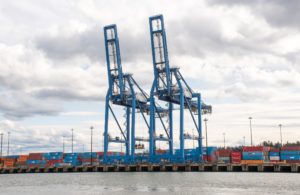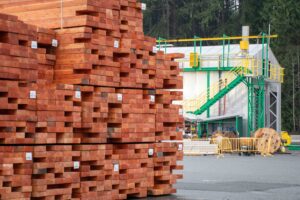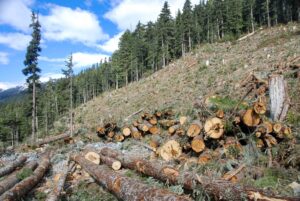
Kelly McCloskey

Robert McKellar
When we first reached out to political risk expert Robert McKellar in mid-2024, our goal was to spark a conversation the forest sector wasn’t yet having—about political risk and its growing influence on everything from trade policy to investment decisions. Robert’s op-ed in August, 2024 made the case that political risk is not just something that happens in volatile regions—it is the exposure of businesses to political forces, whether through government policies, trade dynamics, or geopolitical shifts. He identified major political forces impacting the Canadian forest sector—including the growing China-West rivalry and Canada-US trade friction—to help companies assess the relevance of political risk for themselves. In hindsight, his foresights were well placed.
After the election of President Trump and given how quickly the trade situation evolved, we reached out to Robert a few weeks ago to re-examine these dynamics. And given the complexities, we decided on a two-part approach. In Part I, in February 2025, Robert set the stage by looking at Trump’s leadership style and his approach to business, he outlined how forest product companies can assess and manage political risk, and then he focused on the most pressing risk to the sector—tariffs. The other risks—lumber duties, interference in Canadian-owned US-based industries, and the impact of US-China trade tensions on lumber sales—were left for Part II. In that this is a long read, in the “READ MORE document” are the following hyperlinked-titles—should you wish to proceed directly to a given section:
- Recap of Part I
- Is Trump toying with Canada or is there a plan?
- The latest on duties and tariffs
- Are Canadian US-subsidiaries at risk?
- US-China friction and lumber sales
- How to plan and manage for political risk
This isn’t a typical industry commentary. It’s not about what government should do, or where markets might go next. It’s about what companies can do now to better anticipate, adapt to, and, at times, even leverage political disruption. [full disclosure, Robert McKellar is Tree Frog co-editor Sandy McKellar’s brother]
 Planting a tree can seem like an easy win for the planet. It’s a popular pledge for corporations and organizations eager to participate in sustainability programs and promote environmental responsibility. But here’s the catch: not all trees have the same impact, and not all tree-planting efforts contribute to forest sustainability. As we approach International Day of Forests, it’s worth asking: Are we missing the forests for the trees? Many sustainability programs focus on planting but often overlook the critical role of future forest management — particularly the need for processes like forest thinning. Thinning removes competitive trees which allows the healthiest trees to grow larger and more valuable, and be better equipped to withstand droughts, wildfires, diseases and insect infestations.
Planting a tree can seem like an easy win for the planet. It’s a popular pledge for corporations and organizations eager to participate in sustainability programs and promote environmental responsibility. But here’s the catch: not all trees have the same impact, and not all tree-planting efforts contribute to forest sustainability. As we approach International Day of Forests, it’s worth asking: Are we missing the forests for the trees? Many sustainability programs focus on planting but often overlook the critical role of future forest management — particularly the need for processes like forest thinning. Thinning removes competitive trees which allows the healthiest trees to grow larger and more valuable, and be better equipped to withstand droughts, wildfires, diseases and insect infestations. US President Donald Trump’s coming wave of tariffs is poised to be more targeted than the barrage he has threatened, aides and allies said. …The White House is narrowing its approach to take effect on April 2, likely omitting a set of industry-specific tariffs while applying reciprocal levies on a targeted set of nations that account for the bulk of foreign trade with the US. …The White House is still planning to unveil the reciprocal -tariff action on that day, though. …The fate of the sectoral tariffs, as well as tariffs on Canada and Mexico that Trump said were justified by fentanyl, remains uncertain. …The administration is now focusing on applying tariffs to about 15% of nations with persistent trade imbalances with the US… such as Australia, Brazil, Canada, China, the European Union, India, Japan, South Korea, Mexico, Russia, and Vietnam.
US President Donald Trump’s coming wave of tariffs is poised to be more targeted than the barrage he has threatened, aides and allies said. …The White House is narrowing its approach to take effect on April 2, likely omitting a set of industry-specific tariffs while applying reciprocal levies on a targeted set of nations that account for the bulk of foreign trade with the US. …The White House is still planning to unveil the reciprocal -tariff action on that day, though. …The fate of the sectoral tariffs, as well as tariffs on Canada and Mexico that Trump said were justified by fentanyl, remains uncertain. …The administration is now focusing on applying tariffs to about 15% of nations with persistent trade imbalances with the US… such as Australia, Brazil, Canada, China, the European Union, India, Japan, South Korea, Mexico, Russia, and Vietnam. US builders pay a premium for the spruce, pine and fir (SPF) lumber that BC produces and could soon face additional tariffs after Trump’s proclamation that America doesn’t need the province’s wood. They like it, particularly for framing walls because SPF is lighter, stronger and tighter-grained than the more abundant southern yellow pine lumber that has a reputation for warping. …“There’s just this gap between what the U.S. can supply and what their demand is,” said Kurt Niquidet, president of the B.C. Lumber Trade Council. ..“There’s no way American supply, in the short-term, can do anything but rely on Canadian lumber,” Russ Taylor said. “Tariffs are just going to push the price up and create shortages,” Taylor said. “It’s just going to be market chaos, as it will be with OSB panels as it will be with pulp and newsprint.”
US builders pay a premium for the spruce, pine and fir (SPF) lumber that BC produces and could soon face additional tariffs after Trump’s proclamation that America doesn’t need the province’s wood. They like it, particularly for framing walls because SPF is lighter, stronger and tighter-grained than the more abundant southern yellow pine lumber that has a reputation for warping. …“There’s just this gap between what the U.S. can supply and what their demand is,” said Kurt Niquidet, president of the B.C. Lumber Trade Council. ..“There’s no way American supply, in the short-term, can do anything but rely on Canadian lumber,” Russ Taylor said. “Tariffs are just going to push the price up and create shortages,” Taylor said. “It’s just going to be market chaos, as it will be with OSB panels as it will be with pulp and newsprint.” In seeking to justify his imbecilic trade war against Canada, Donald Trump
In seeking to justify his imbecilic trade war against Canada, Donald Trump 
 US President Donald Trump’s tariff threat could motivate more Canadian lumber producers to shift to the US southern border while accelerating efforts to find new markets, industry experts said. The levies are the latest in a nearly four-decade dispute between the neighbors over softwood lumber, used in construction, furniture and paper production. Levies on Canadian lumber could hit 40% if current duties of 14.54%, and Trump’s proposed 25% tariffs are added. …”Disparity in log costs and availability are the major drivers here, but Canadian investment in the region has certainly been partially motivated to moving operations where they avoid the impact of duties,” said Dustin Jalbert at FastMarkets. …”In 2004, there were only two sawmills owned by a Canadian manufacturer. Today, we have more than 50,” said Kyle Little, at Sherwood Lumber.” Canadian companies now produce more than a third of the volume of the largest producing region in the US – the US South.”
US President Donald Trump’s tariff threat could motivate more Canadian lumber producers to shift to the US southern border while accelerating efforts to find new markets, industry experts said. The levies are the latest in a nearly four-decade dispute between the neighbors over softwood lumber, used in construction, furniture and paper production. Levies on Canadian lumber could hit 40% if current duties of 14.54%, and Trump’s proposed 25% tariffs are added. …”Disparity in log costs and availability are the major drivers here, but Canadian investment in the region has certainly been partially motivated to moving operations where they avoid the impact of duties,” said Dustin Jalbert at FastMarkets. …”In 2004, there were only two sawmills owned by a Canadian manufacturer. Today, we have more than 50,” said Kyle Little, at Sherwood Lumber.” Canadian companies now produce more than a third of the volume of the largest producing region in the US – the US South.” CNN’s Vanessa Yurkevich explains how much US home prices could increase due to President Donald Trump’s tariffs. [Video report only, 2 .5 minutes]
CNN’s Vanessa Yurkevich explains how much US home prices could increase due to President Donald Trump’s tariffs. [Video report only, 2 .5 minutes]
 There is a 20% tariff on products from China and 25% on many goods from Canada and Mexico. What is sure is that they will increase the cost of DIY projects and home renovations, says Pelin Pekgun, at Wake Forest University School of Business. …“While prices will not rise immediately, higher material costs, potential shortages and supply delays could result in tighter renovation budgets in the coming months.” …One of the most significant products the tariffs will impact is lumber. More than 25% of cement and concrete are imported from Canada and Mexico, so the cost of pouring foundations and flatwork, such as driveways and walkways, will likely increase. …Many other building materials will likely get more expensive, including flooring, cabinets, countertops and lighting. Though not a direct consequence of tariffs, labor costs are also a growing concern in the construction industry, says roofer Michael Green.
There is a 20% tariff on products from China and 25% on many goods from Canada and Mexico. What is sure is that they will increase the cost of DIY projects and home renovations, says Pelin Pekgun, at Wake Forest University School of Business. …“While prices will not rise immediately, higher material costs, potential shortages and supply delays could result in tighter renovation budgets in the coming months.” …One of the most significant products the tariffs will impact is lumber. More than 25% of cement and concrete are imported from Canada and Mexico, so the cost of pouring foundations and flatwork, such as driveways and walkways, will likely increase. …Many other building materials will likely get more expensive, including flooring, cabinets, countertops and lighting. Though not a direct consequence of tariffs, labor costs are also a growing concern in the construction industry, says roofer Michael Green. Last week, consumers in four states filed a proposed class action against Amazon, accusing the company of greenwashing by misleading consumers about the sustainability of the company’s Amazon Basics line of paper products. Here are some of the key allegations: Amazon uses a Sustainability Leaf and a Climate Pledge Friendly logo to suggest that Amazon’s supply chain for Amazon Basics paper products uses sustainable forestry practices. …However, because Amazon sources its Amazon Basics paper products from suppliers who clearcut and burn centuries-old forests, Amazon is exaggerating any environmental benefits. …The Forest Stewardship Council (or “FSC”) requires companies to use different FSC logos to depict different levels of commitment to responsible forest management. Despite this, Amazon uses an unqualified Forest Stewardship Council logo. …This Complaint challenges an arguably very sustainably-minded company. We learned this week that Amazon announced the launch of a new carbon credit investment service.
Last week, consumers in four states filed a proposed class action against Amazon, accusing the company of greenwashing by misleading consumers about the sustainability of the company’s Amazon Basics line of paper products. Here are some of the key allegations: Amazon uses a Sustainability Leaf and a Climate Pledge Friendly logo to suggest that Amazon’s supply chain for Amazon Basics paper products uses sustainable forestry practices. …However, because Amazon sources its Amazon Basics paper products from suppliers who clearcut and burn centuries-old forests, Amazon is exaggerating any environmental benefits. …The Forest Stewardship Council (or “FSC”) requires companies to use different FSC logos to depict different levels of commitment to responsible forest management. Despite this, Amazon uses an unqualified Forest Stewardship Council logo. …This Complaint challenges an arguably very sustainably-minded company. We learned this week that Amazon announced the launch of a new carbon credit investment service. Earlier this month, President Donald Trump signed
Earlier this month, President Donald Trump signed 
 President Donald Trump’s March 1 executive order calling for “immediate expansion of American timber production” generated lots of enthusiasm in the Northwest wood products world. But analysts added equal amounts of concern that Trump’s Department of Government Efficiency-driven federal cuts might keep the woods quiet. “It’s going to be a good thing in terms of helping stimulate activity on national forests,” the University of Montana’s Todd Morgan said… but also recognizes the uncertainty spiraling around Washington, D.C. “A lot is going to depend on who’s left in federal agencies at the end of the day, the week, the next four years,” he said. “All this funding- and budget-cutting is going to interfere with the stated goals.” …Trump’s order also calls for timber production targets. That’s something that has been missing from federal land management for a long time, according to Montana Wood Products Association Director Julia Altemus.
President Donald Trump’s March 1 executive order calling for “immediate expansion of American timber production” generated lots of enthusiasm in the Northwest wood products world. But analysts added equal amounts of concern that Trump’s Department of Government Efficiency-driven federal cuts might keep the woods quiet. “It’s going to be a good thing in terms of helping stimulate activity on national forests,” the University of Montana’s Todd Morgan said… but also recognizes the uncertainty spiraling around Washington, D.C. “A lot is going to depend on who’s left in federal agencies at the end of the day, the week, the next four years,” he said. “All this funding- and budget-cutting is going to interfere with the stated goals.” …Trump’s order also calls for timber production targets. That’s something that has been missing from federal land management for a long time, according to Montana Wood Products Association Director Julia Altemus.
 NEW YORK — A jury in Georgia has ordered Monsanto parent Bayer to pay nearly $2.1 billion in damages to a man who says the company’s Roundup weed killer caused his cancer. The verdict marks the latest in a long-running series of court battles Monsanto has faced over its Roundup herbicide. The agrochemical giant says it will appeal the verdict. The penalties awarded include $65 million in compensatory damages and $2 billion in punitive damages. That marks one of the largest legal settlements reached in a Roundup-related case to date. …Germany-based Bayer, which acquired Monsanto in 2018, has continued to dispute claims that Roundup causes cancer. But the company has been hit with more than 177,000 lawsuits involving the weedkiller and set aside $16 billion to settle cases. Monsanto said Friday’s verdict “conflicts with the overwhelming weight of scientific evidence and the consensus of regulatory bodies and their scientific assessments worldwide.”
NEW YORK — A jury in Georgia has ordered Monsanto parent Bayer to pay nearly $2.1 billion in damages to a man who says the company’s Roundup weed killer caused his cancer. The verdict marks the latest in a long-running series of court battles Monsanto has faced over its Roundup herbicide. The agrochemical giant says it will appeal the verdict. The penalties awarded include $65 million in compensatory damages and $2 billion in punitive damages. That marks one of the largest legal settlements reached in a Roundup-related case to date. …Germany-based Bayer, which acquired Monsanto in 2018, has continued to dispute claims that Roundup causes cancer. But the company has been hit with more than 177,000 lawsuits involving the weedkiller and set aside $16 billion to settle cases. Monsanto said Friday’s verdict “conflicts with the overwhelming weight of scientific evidence and the consensus of regulatory bodies and their scientific assessments worldwide.”  Virginia loggers hope steps taken by President Donald Trump will breathe new life into parts of the Commonwealth they feel have long been abandoned. …Canada is the largest exporter of lumber into the US. The lumber industry in the United State has a long history and has been financially rocky in recent decades. Unregulated cutting up to the 1980s damaged land and water systems. Regulations followed. Then international trade agreements saw production shipped overseas, further denting an industry that literally built America. But loggers in Virginia have stuck with it. Among them is Vance Wright. …Trump’s shortest-term impact on logging may be with tariffs. But logging and timber have long been subject to different international trade deals. And while those international markets arguably killed Virginia’s manufacturing, think Martinsville’s now-shuttered furniture factories, it also opened doors to new opportunities.
Virginia loggers hope steps taken by President Donald Trump will breathe new life into parts of the Commonwealth they feel have long been abandoned. …Canada is the largest exporter of lumber into the US. The lumber industry in the United State has a long history and has been financially rocky in recent decades. Unregulated cutting up to the 1980s damaged land and water systems. Regulations followed. Then international trade agreements saw production shipped overseas, further denting an industry that literally built America. But loggers in Virginia have stuck with it. Among them is Vance Wright. …Trump’s shortest-term impact on logging may be with tariffs. But logging and timber have long been subject to different international trade deals. And while those international markets arguably killed Virginia’s manufacturing, think Martinsville’s now-shuttered furniture factories, it also opened doors to new opportunities. Wildfires forced a mandatory evacuation Sunday in a North Carolina county still recovering from Hurricane Helene, and South Carolina’s governor declared an emergency in response to a growing wildfire in that state. Hundreds of miles north, the New Jersey Forest Fire Service was battling a blaze in the Wharton State Forest. The North Carolina Department of Public Safety announced a mandatory evacuation starting at 8:20 p.m. Saturday for parts of Polk County in western North Carolina about 80 miles west of Charlotte. A shelter had been established in Columbus, North Carolina. …Also this weekend, the New Jersey Forest Fire Service has been battling a wildfire that broke out in the Wharton State Forest on Saturday. The fire had consumed about 2.7 square miles as of early Sunday morning and was about 50% contained, according to an 8 a.m. update.
Wildfires forced a mandatory evacuation Sunday in a North Carolina county still recovering from Hurricane Helene, and South Carolina’s governor declared an emergency in response to a growing wildfire in that state. Hundreds of miles north, the New Jersey Forest Fire Service was battling a blaze in the Wharton State Forest. The North Carolina Department of Public Safety announced a mandatory evacuation starting at 8:20 p.m. Saturday for parts of Polk County in western North Carolina about 80 miles west of Charlotte. A shelter had been established in Columbus, North Carolina. …Also this weekend, the New Jersey Forest Fire Service has been battling a wildfire that broke out in the Wharton State Forest on Saturday. The fire had consumed about 2.7 square miles as of early Sunday morning and was about 50% contained, according to an 8 a.m. update.